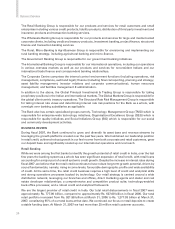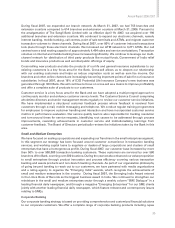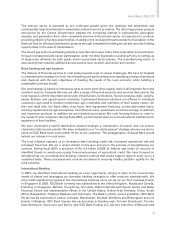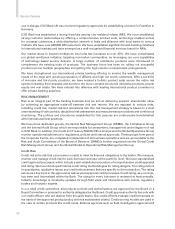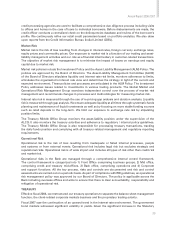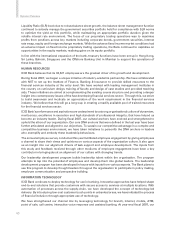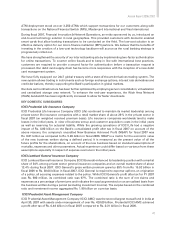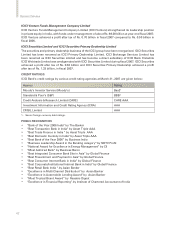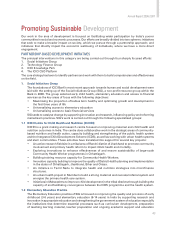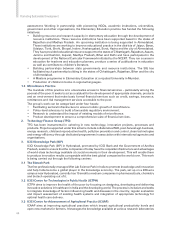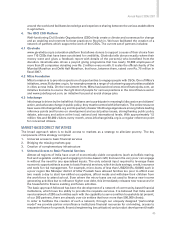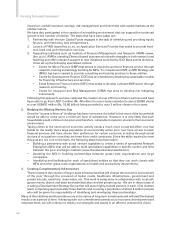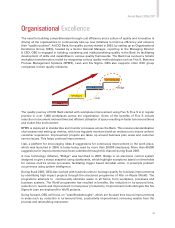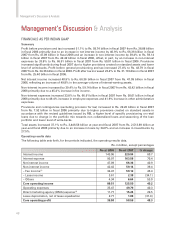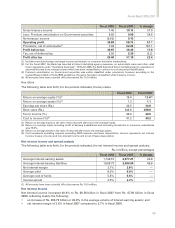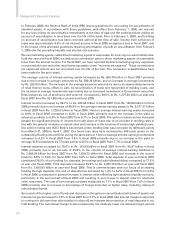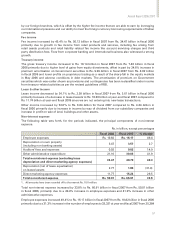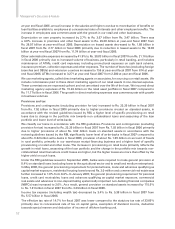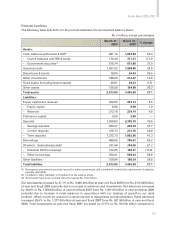ICICI Bank 2007 Annual Report Download - page 45
Download and view the complete annual report
Please find page 45 of the 2007 ICICI Bank annual report below. You can navigate through the pages in the report by either clicking on the pages listed below, or by using the keyword search tool below to find specific information within the annual report.
43
Annual Report 2006-2007
Our work in the area of development is focused on facilitating wider participation by India’s poorer
communities in social and economic processes. Our efforts are broadly divided into two spheres: initiatives
that seek to make a broader impact on society, which we pursue through a partnership approach; and
initiatives that directly impact the economic well-being of individuals, where we have a more direct
engagement.
PARTNERSHIP-BASED DEVELOPMENT INITIATIVES
The principal interventions in this category are being carried out through four sharply focused efforts:
1. Social Initiatives Group
2. Technology Finance Group
3. ICICI Knowledge Park
4. The ICICI CSO Platform
The core strategy has been to identify partners and work with them to build competencies and effectiveness
on the field.
1. Social Initiatives Group
The foundations of ICICI Bank’s most recent approach towards human and social development were
laid with the setting up of the Social Initiatives Group (SIG), a non-profit resource group within the
Bank in 2000. The group selected early child health, elementary education and access to financial
services as the key areas of focus with the following objectives:
• Maximising the proportion of babies born healthy and optimising growth and development in
the first three years of life
• Universalising access to elementary education
• Universalising access to basic financial services
SIG seeks to catalyse change by supporting innovation and research, influencing policy and reforming
mainstream practices. SIG’s work is carried out through the following specialised groups:
1.1 ICICI Centre for Child Health and Nutrition (ICCHN)
ICCHN is a grant making and research centre focused on improving maternal and child health and
nutrition outcomes in India. The centre does collaborative work in the strategic areas of community-
based nutrition and health action, capacity building and strengthening of the public health system
and the Integrated Child Development Scheme (ICDS), as well as working with urban health systems
and slum communities. These activities have translated into support for several key projects:
• An action research field site in a tribal area of Ranchi district of Jharkhand to promote community
involvement and primary health reform to impact infant health and mortality.
• Exploring innovations to enhance effectiveness of and ensure sustainability of large-scale
Community Health Worker programmes in Chhattisgarh.
• Building training resource capacity for Community Health Workers.
• Innovative capacity building to improve the quality of District Health planning and implementation
in the states of Chhattisgarh, Jharkhand, Bihar and Orissa.
• An initiative in Tamil Nadu to integrate health and nutrition strategies into microfinance
structures.
• An urban health project in Mumbai to build a strong maternal and neonatal referral system and
energise the primary health care system.
• Initiatives in Maharashtra to improve child development in the tribal districts through building the
capacity of and facilitating convergence between the ICDS programme and the health system.
1.2 Elementary Education Practice
The Elementary Education practice of SIG is focused on improving the quality and provision of early
childhood (3-6 years) and elementary education (6-14 years) in India by supporting research and
innovation in appropriate education and strengthening the government system of education especially
the institutions that determine essential processes such as curriculum development, preparation
of teaching learning material, teacher preparation and ongoing academic support and education
Promoting Sustainable Development



